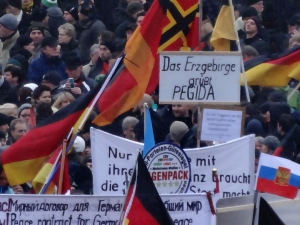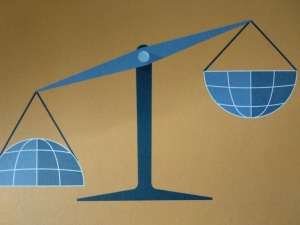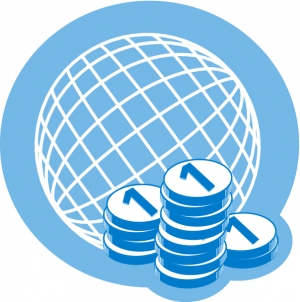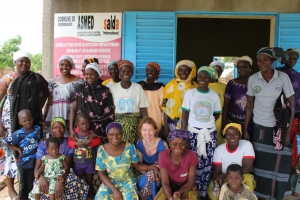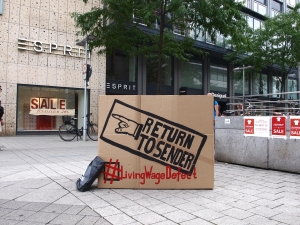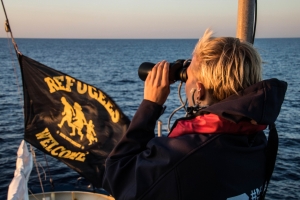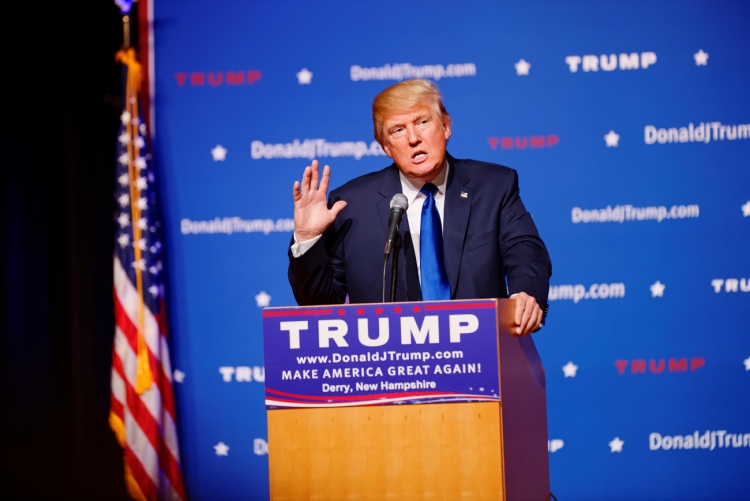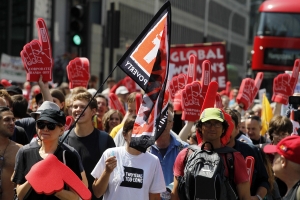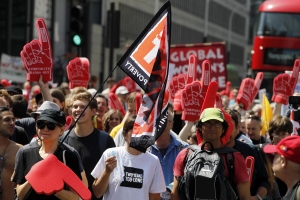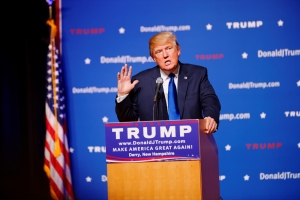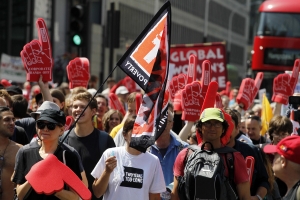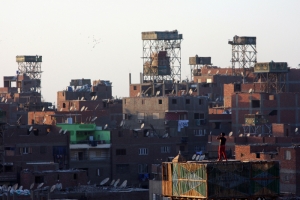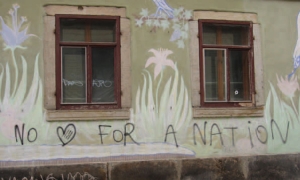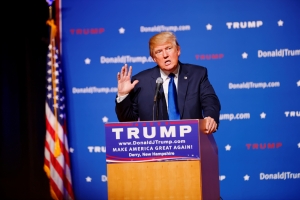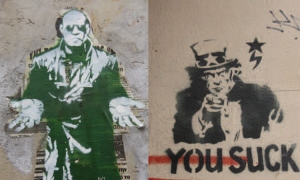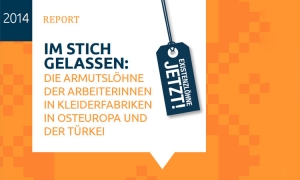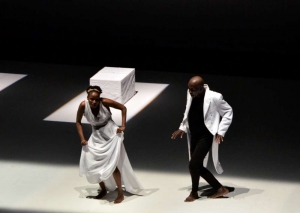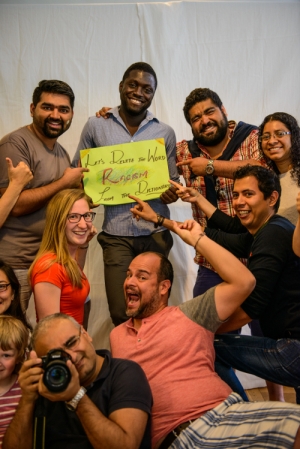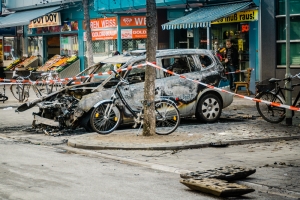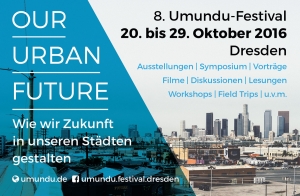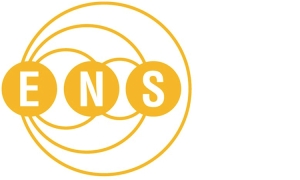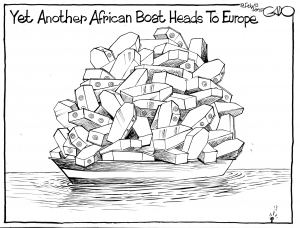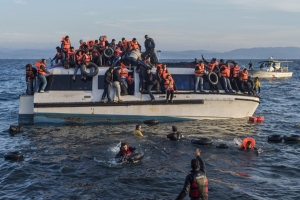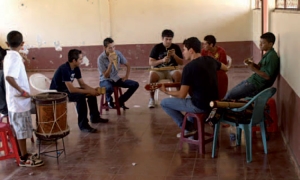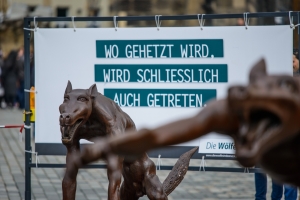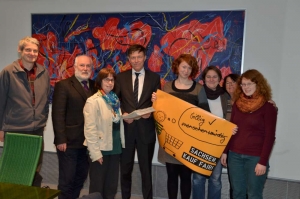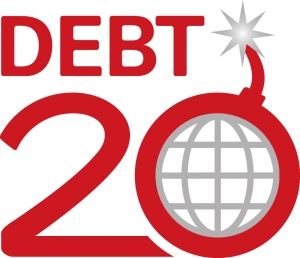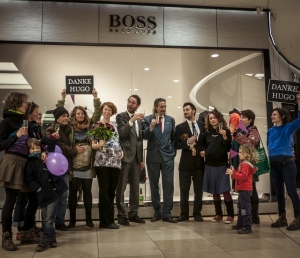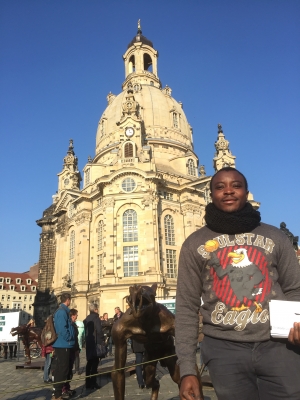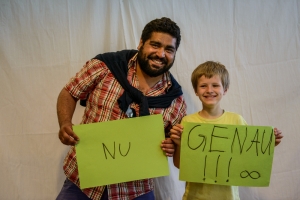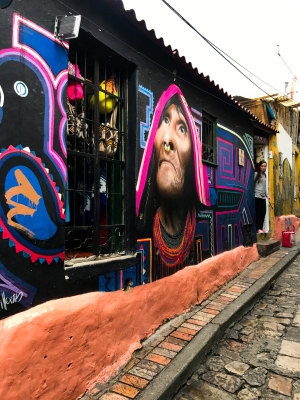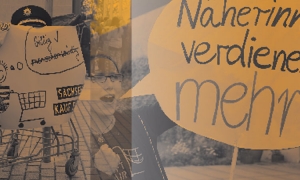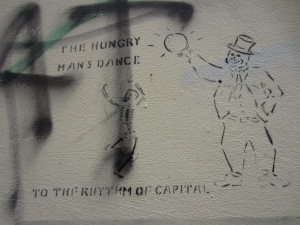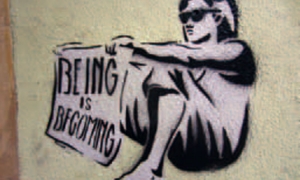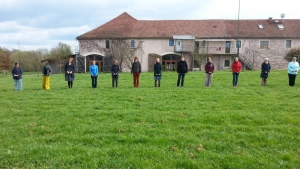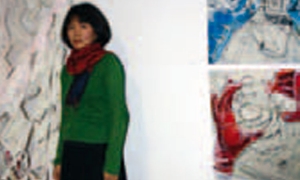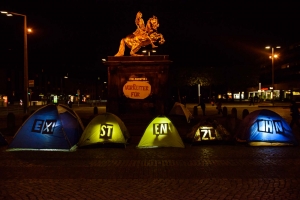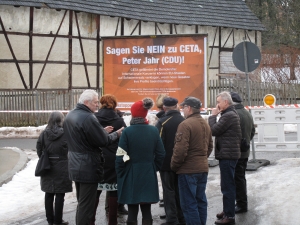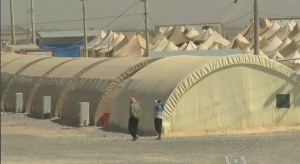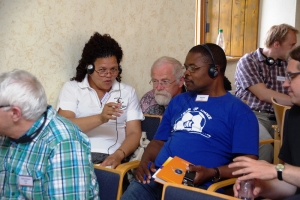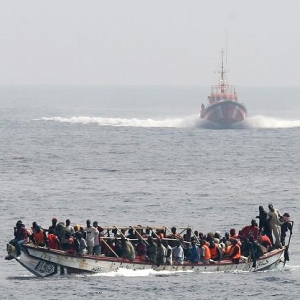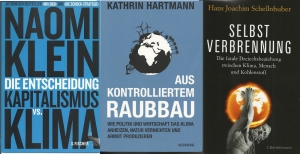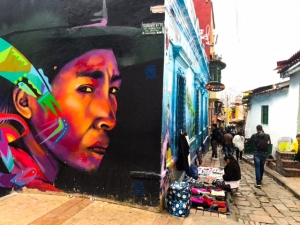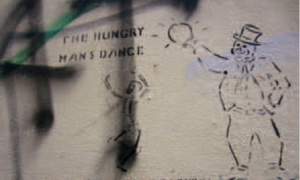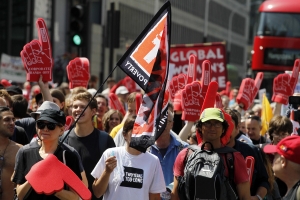Till:
One who is a Dresdner can easily remember how at the end of 2014, Pegida was founded, a generally strong, populist right-wing group with right-wing tendencies. Racism and general conservative ideology has always been a visible problem in Dresden/Saxony. This is even more obvious for people traveling in leftist-circles. However, opinions similar to those of Pegida, have moved into mainstream dialogue and are gaining support. One can clearly see that lately, there has been a tremendous shift towards the political right in Germany. The discussions are rarely objective and the language is much more extreme, hateful and emotional, particularly because of what is seen on the internet, for example, on Facebook. One reason as to this change in dialogue in my opinion, is that the public debate has been almost completely led by right-wing movements. With the public right inciting propaganda, of course, the violence has increased against dissidents and especially against people with immigrant backgrounds. In addition, the opposition to such a shift in East German is rather weak.
Annie:
Like Germany, the US is experiencing a growing divide between right and left, a divide that has widened significantly in the last decade. There has been a strong shift towards a more conservative stance, a shift that was accelerated after the 9/11 attacks when issues of security assumed greater importance than issues of freedom, liberty and rights. In this regard, the political divide in my view is less expressed in debates over America’s foreign policy but is painfully visible in a range of critical domestic issues. For example we see an increasingly hostile and seemingly irreconcilable discussion around issues as vital as racism, gun-control, abortion rights, poverty alleviation and social welfare and refugee immigration. While Germany has several different political parties, America is dominated by just two: Republican and Democrat and on certain issues, particularly regarding foreign policy, the two parties often seem to align more than diverge. In this context, how can dissent have an impact and be meaningful in American political life?
I strongly believe that a majority of Americans feel left behind socially, politically, but especially economically. In an age of globalization and rapid technological change, there is a growing gap in the US as elsewhere in the world between the very rich and all the rest especially the working class and poor. The rich have what seems to be unlimited power and access while the working majority is effectively powerless and marginalized. The anger and fear that result, which are often expressed in xenophobic and racist terms, is what has fuelled the rise of the extreme right both in the US and Europe. People are scared of how vulnerable they have become and the lack of options they possess. They fear for their futures and those of their children. Here I would say that while I strenuously oppose a Trump presidency and strongly disagree with those who support him, I do understand why that support exists.
Till:
I also think that the approach of Trump is very similar to that of Pegida: in these kinds of movements, politicians play on people’s fears and will deliberately distort facts and images of “the enemy” to attract followers. Furthermore, right-wing populists have also become stronger in the German parliament, which one can see with the Alternative for Germany (AfD). Currently, the development is taking place not only in Germany but all of Europe. Various examples of right-wing and right-wing movements also appear in other countries, for example, the FPÖ in Austria, the National Front in France, the Golden Dawn in Greece, the Jobbik in Hungary, and the Progress Party in Norway. For all of these movements, the question is almost always about borders. Those people feel that they should have stronger borders and should place more emphasis on national states, furthermore the idea of Europe is refused. This shift to the right is one that is happening all over Europe. The current presidential election in Austria or the proposed referendum on the United Kingdom’s membership in the European Union can be seen as right-wing populist movements, propelled by propaganda to gain more and more followers while society continues to split.
Fq: In this sense, what similarities or differences do you see between Germany and the USA?
Annie:
The policy towards refugees in the US and German differs greatly. For instance, Germany allowed in an estimated 100,000 Syrian refugees while the US allowed about 2,000. While I understand sentiments towards refugee immigration are changing in Germany, I still find Germany more liberal regarding social welfare: Germans get six weeks of paid vacation, free university tuition and health care while everything in the US is privatized and increasingly corporatized. College students are struggling to pay back massive amounts of debt with no guarantee of employment after graduation (and remember many Americans work so they can obtain health insurance benefits, Obamacare notwithstanding) while insurance costs are skyrocketing. It is estimated that total amount of debt in the US for all college students is $1.3 trillion. Unbelievable. Bernie Sanders, one of the candidates who ran for the democratic nomination, advocates free public university education and subsidized health care – something that is considered almost radical in the US.
Till:
If we talk about right-wing populism, I hardly see differences, but there are many similarities. In both countries there is a strengthened sense of right-wing populism and a general shift to the right. There is a lot of hate-language and biased discussions; facts and content play hardly any role and the issues are often the same. For example, refugees and immigrants are portrayed as people who allegedly exploit the social systems, bring crime, foreign culture or religions that are incompatible with those in the west and will ultimately destroy everything. Others feel that their countries need to take a stronger stance and "take care of their own people" first, while addressing officials who help refugees for their own benefits, ie. "those at the top and the left-wing politics that will lead the country and our culture to ruin.” I see few differences, except perhaps that the development of such issues came about in separate ways.
Fq: Do you feel that the youth in your country is politically aware? What about people in your relatives or close friends?
Till:
In leftist-circles, there are of course many politically committed young people. In my former school, however, most young people were barely interested in politics. That's what happens, when young people or people in general are doing well, they often see no reason to be interested in politics. But I also noticed this even during political turmoil in recent years; people’s political interest has barely been heightened by the refugee issues. I feel that there is also a strong fear for the loss of identity, especially in older people, who instinctively fear the loss of culture and of change. But now there is this fear in younger people, which I find particularly unfortunate.
Annie:
I feel uncomfortable making generalizations about an issue that is so broad - youth involvement in politics can vary across socioeconomic class, race, level of education and geographic region – but the American presidential campaign has revealed some very interesting political dynamics that help answer this question.
While it is not possible to pinpoint a demographic profile for supporters of Bernie Sanders, many if not most are young people in their twenties and thirties who see his policies regarding education and healthcare among other issues in line with their political beliefs and aspirations. The Sanders campaign has done a lot to mobilize young people in the US around political action, something that has not happened for some time. Even though he is not the presumptive democratic nominee for president, Bernie Sanders and his campaign have done something very important in my view. They have energized American youth around politics and the possibility of effecting political change. Although Sanders won’t be president, he has encouraged young people to enter politics at all levels as a way of bringing about the kind of political, economic and social change they want. He believes, as many others do, that change comes from below not above and I hope that in the future we will see more young people in America running for local, state and national office than ever before. I should also say that while Donald Trump has his supporters among American youth, there are many young voters who oppose him and are committed to defeating his election. He, too, in his own way, has mobilized young Americans to get more politically involved and stands as an example of the high price we will pay for political apathy and inaction.
With regards to my own circle of friends and family, I am very blessed to have been brought up in a tolerant and open community where I was exposed to a variety of different cultures, languages, ethnicities and arguments. My parents and their friends and colleagues are highly educated professionals and are very politically and historically aware but again, this is not representative of the entire US.
Fq: What political dangers do you foresee in the future and who must do what?
Annie:
Personally, I am worried about the outcome of the elections this year. Under the Obama administration, the US saw considerable progress regarding same sex marriages and health care. Donald Trump has made it very clear that he is against same sex rights and social welfare and I have no doubt that he would do everything in his power to try to reverse the progress made in these and other areas if elected. Furthermore, another crucial issue is our foreign policy in the Middle East, particularly with regard to the Syrian refugee crisis and the Israel-Palestine conflict. Like Germany, the US has very strong anti-Islam and anti-refugee attitudes born of fear and ignorance, and many people automatically and reflexively associate Muslims with terrorism. In general, racism and discrimination are key issues that will impact and be impacted by the results of the next presidential election.
Till:
In movements such as Pegida one major issue is the use of propaganda and incitement, especially against refugees and people with a migrant background. Baiting supporters always leads to violence, which everyone can see especially in Saxony. When speaking about Saxony, the state must absolutely take a stronger stance and do more. Mainly there is not enough political education in Saxony. If you look, for example, at the Saxon curriculum, it is frightening to see how few hours there are for political education and political issues; in comparison with other states, Saxony has, in my opinion, fewer lessons about such topics. Of all the provinces, Saxony has by far the least anti-right movement regarding political education. This also explains why, in Saxony, the rise of right-wing violence is highest and why there is such a strong Pegida movement in Dresden as opposed to elsewhere in Germany. The problem is that the Saxony government, which is now dominated by the Christian Democratic Union (CDU), has ignored these problems for years, remaining dead silent and doing little to fix them. These issues contribute to Saxony’s negative image, which is already relatively high because of its largely anti-foreign sentiment, and are furthered because of the problems caused by right-wing extremism. However, the opposition should do much more to fix it.
Fq: As young people, what can you do to change the situation or what kinds of messages can you give to others?
Till:
As a young person, there is not much one can do. I can, for example, go to demonstrations against Pegida and set an example for others, while also staying informed about current political events and facts. Sometimes I speak with friends and acquaintances about relevant issues. In doing so, you can sometimes bring people together to deal with a specific topic. But you can of course also join a political associations or engage in political education by partaking in debates and studying facts that sensitize people to issues such as "Asylum and Refugees" or "racism and nationalism", but unfortunately very few young people do so and only in leftist circles. Otherwise, I can only say that young people should remain informed, debate openly with the people and attend demonstrations. I also think that being critical is important as well as questioning things. People must reflect before passing judgement on situations. One has to consider all points of view and deal with facts.
Annie:
My parents always taught me to question what you are told. I think this is one of the most important lessons we can learn as young people. One should always think critically about what one hears, whether from government, media or academia. Such questioning is essential to learning and enlightenment. Questioning authority and received opinion is vital as is the need to constantly educate and inform oneself. Education is key as is dissent; without them tolerance and understanding are impossible


